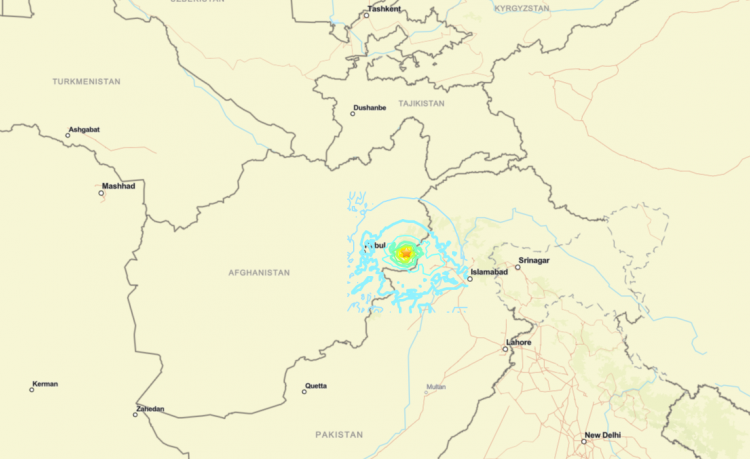A powerful earthquake struck eastern Afghanistan late Sunday night, killing more than 800 people and injuring at least 2,800, according to authorities, in one of the country's deadliest disasters since the Taliban took power. Entire villages were flattened in the mountainous provinces of Kunar and Nangarhar, where mudbrick homes crumbled under the force of the tremor.
The magnitude-6 quake hit near midnight at a shallow depth of about six miles, the U.S. Geological Survey said. Taliban spokesman Zabihullah Mujahid confirmed that 812 people had died, including at least 610 in Kunar, while dozens more were killed in neighboring Nangarhar. Rescue efforts were hampered by heavy rains, landslides and collapsed roads, officials said.
Sharafat Zaman, spokesperson for the Taliban health ministry, appealed to the international community for urgent help. "We need it because here lots of people lost their lives and houses," he told Reuters. Abdul Maten Qanee, another health ministry spokesperson, said, "All our ... teams have been mobilised to accelerate assistance, so that comprehensive and full support can be provided."
Survivors described harrowing escapes. "I managed to rescue two of my children and brought them outside to safety. I went back inside to save my younger siblings, but as I did, the roof and walls collapsed around me," said Hameed Jan, a resident of Piran village in Kunar. He lost his wife, two sons and two brothers in the collapse. "It felt as if the entire mountain was collapsing on us," he said.
Sanaullah, another villager from Kunar, said his brother and five children were killed. "It is the story of each and every house here," he said. "Everyone I know here has lost at least three to five family members." Abdul Rahim, a local cleric in Mazar valley, described mass burials. "Everywhere people are crying and embracing one another following a mass funeral," he said. "The death toll is so high that graveyards are overflowing."
Rescue teams struggled to reach remote areas cut off from mobile networks near the Pakistani border. Kate Carey, an officer with the U.N. Office for the Coordination of Humanitarian Affairs, said, "The area of the earthquake was affected by heavy rain in the last 24-48 hours as well, so the risk of landslides and rock slides is also quite significant - that is why many of the roads are impassable." Helicopters ferried the wounded as military flights evacuated 420 dead and injured, the defense ministry said.
Taliban international spokesperson Sohail Shaheen acknowledged the limits of the government's resources. "Many villages are not accessible yet," he said. "I fear the casualties are very high." A resident of Maza Dara, who declined to give his name, voiced anger at the official response. "There are women and children pleading for help but there are no authorities present to help them," he said. "Everyone is trapped under the rubble and we are helpless and seeing them dying in front of our eyes."
The disaster comes as Afghanistan faces dwindling humanitarian funding. U.N. officials say more than half the population requires urgent aid, yet international contributions have fallen sharply, from $3.8 billion in 2022 to $767 million this year. Political tensions over Taliban restrictions on women aid workers have further complicated relief efforts. "So far, no foreign governments have reached out to provide support for rescue or relief work," Afghanistan's foreign ministry said Monday.
China and India announced initial relief pledges, with Beijing offering support "according to Afghanistan's needs" and New Delhi dispatching 1,000 family tents and 15 tonnes of food aid. U.N. Secretary General António Guterres said the U.N. mission in Afghanistan was preparing to assist those affected.






